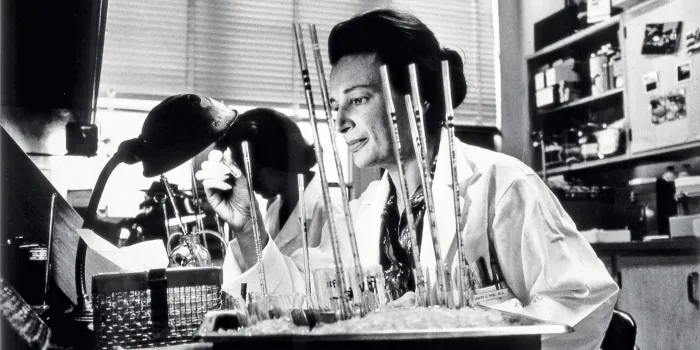While the name Judith Graham Pool may not be immediately recognizable to many people in the bleeding disorders community today, her discovery in 1965 revolutionized care for people with hemophilia. The Stanford University physiologist developed a simple and effective method of freezing and then thawing donor plasma in order to concentrate factor VIII.
Today, Pool’s legacy lives on, not just because of her important research finding, but also because of the National Hemophilia Foundation (NHF) flagship research award that bears her name.
Since the Judith Graham Pool (JGP) Postdoctoral Research Fellowship Program began in 1972, more than 80 aspiring scientists have been able to conduct research in basic science and preclinical research in bleeding disorders. Of those fellows, seven have gone on to become hemophilia treatment center physicians, 17 have contributed to the current application of gene therapy and 14 have contributed to novel factor therapies.
Unlike other fellowships that receive support from pharmaceutical companies, all of the funding for the JGP program comes from donations from NHF chapters and individuals.
“Our contributions each year help support research in the development of better treatments, improved testing methods and more accurate understanding of the genetics of hemophilia and other inheritable bleeding disorders,” says Bridget Tyrey, executive director of Gateway Hemophilia Association in St. Louis.
“It’s amazing to see how this research has advanced over the years, especially in the area of gene therapy,” says Laurie Reger, executive director of the Hemophilia Center of Western New York, in Buffalo. “Thanks to the JGP program, we are now getting closer and closer to the possibility of using gene therapy as a cure for hemophilia.”
Chapter support of the JGP program is vital because it helps attract aspiring scientists to the field of bleeding disorders research.
“Let’s face it, bleeding disorders don’t get a fraction of the play that other diseases get because we’re such a small community,” says Iris Meadow, a board member of the Hemophilia Foundation of Northern California in Emeryville, who has a son with hemophilia. “That’s why this kind of research funding is extraordinarily important. Without research, there is absolutely no hope.”
Meadow says when her son was diagnosed with hemophilia at birth 39 years ago, she knew nothing about the disorder and asked one of the doctors if it was curable. “The answer I got was, ‘Not in your son’s lifetime,’” recalls Meadow. “But now, who knows? Tomorrow, it could be a whole other story.”
NHF Chapters Supporting the 2016 JGP Fellowships
Eastern Pennsylvania Chapter of NHF
(Springfield, PA)
Florida Hemophilia Association
(Fort Lauderdale, FL)
Gateway Hemophilia Association
(St. Louis, MO)
Hemophilia Association of the Capital Area
(Springfield, VA)
Hemophilia Center of Western New York
(Buffalo, NY)
Hemophilia Foundation of Greater Florida
(Winter Park, FL)
Hemophilia Foundation of Minnesota/Dakotas
(Mendota Heights, MN)
Hemophilia Foundation of Northern California
(Emeryville, CA)
Hemophilia Foundation of Southern California
(Los Angeles, CA)
Hemophilia of Georgia
(Atlanta, GA)
Hemophilia of Iowa
(Cedar Rapids, IA)
Hemophilia of South Carolina
(Greenville, SC)
Lone Star Chapter of NHF
(Houston, TX)
Midwest Hemophilia Association
(Leawood, KS)
New York City Hemophilia Chapter
(New York, NY)
Northern Ohio Hemophilia Foundation
(Independence, OH)
Southwestern Ohio Hemophilia Foundation
(Moraine, OH)
Virginia Hemophilia Foundation
(Richmond, VA)
Western Pennsylvania Chapter of NHF
(Cranberry Township, PA)

